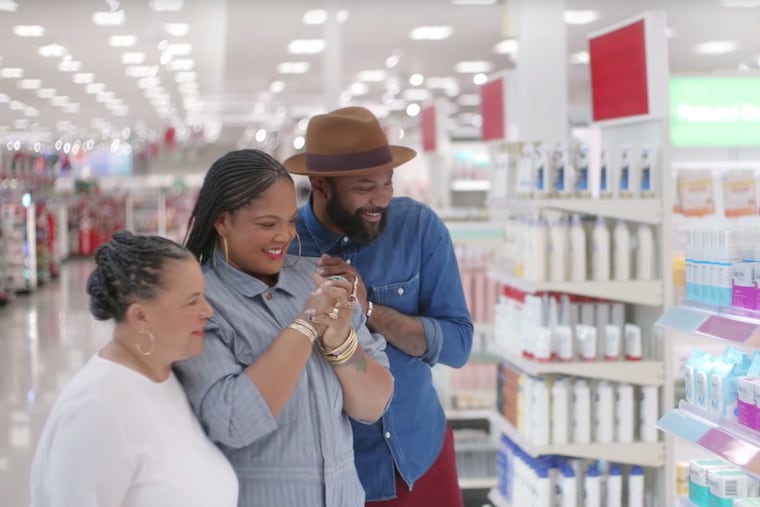Honey Pot’s CEO is being proud, not racist. There is a difference. | Elizabeth Wellington
Unfortunately, it seems certain people have had a very hard time discerning the difference between black pride and white pride. Here is a primer.

Watching a Law & Order SVU marathon Saturday afternoon, I was struck by a Target commercial advertising Honey Pot, a line of feminine hygiene products.
During the 15-second spot, Atlanta-based entrepreneur Beatrice Dixon thanked Target for helping her develop the brand of all-natural, organic products, with the commercial ending on this uplifting note: “The reason why it’s so important for Honey Pot to do well is so the next black girl that comes up with a great idea can have a better opportunity. That means a lot to me.”
“You go, girl," I said out loud to the television before moving on to the next SVU episode. (The commercial, which debuted Feb. 4, is a celebration of Black History Month and Women’s History Month.)
So, you can imagine my surprise Monday morning when my social media was all aflutter with accusations that the Honey Pot commercial was racist.
Huh? What?
Apparently the same commercial I found empowering, several reviewers on the review platform Trustpilot found offensive.
These viewers — many of whom identified as white women — surmised that a black woman excited to be a black woman in business threatened their joy. So they trashed the product. Here is a sampling of the crazy: "Black girls are empowered using this product.... I guess white girls aren’t. I’ll be letting Target know about this racist company.”
Within a few hours, Honey Pot’s ratings took a big dip.
But the dip didn’t last very long because black women did what we do best. We rallied. When I checked Honey Pot’s reviews on Trustpilot Tuesday morning, there were pages of five-star reviews, so many that the site wasn’t taking any more reviews. And Dixon told BuzzFeed Monday that her company’s sales were 40% to 50% higher than usual for a typical day.
Great. I am beyond happy that Dixon’s business was able to weather such ridiculousness. But let’s go back and unpack the problems here.
Dixon did not say that her products were only for black women. Nor did she say she didn’t want to be a role model for white women business founders. What Dixon likes, as CEO at Honey Pot, is being a possible inspiration to girls who look like her. Perhaps she’s the type of role model she wishes she had as a child. (When I reached out to her, I got an automatic email response saying they were inundated with requests to talk to her.) It’s been proven that when children see people who look like them excel, they are driven to excel.
Unfortunately, it seems certain people have a very hard time discerning the difference between black pride and white pride — whether we’re talking sports, politics, or Disney princesses. I’m called racist any time I write about an issue that disproportionately affects black people.
Here is a primer:
When black people are proud, we are simply happy to have achieved a little bit of anything in a world that constantly tells us we don’t deserve happiness. Proud black people never stopped white people from getting jobs. We never denied white people loans to build homes. We did not burn crosses on folks’ lawns, or enslave them for 300 years, or shoot people in churches. Nor did we ever burn entire neighborhoods to the ground because we didn’t want white people to thrive.
That honor goes to those who say they have white pride.
“When white people call black people racists, they are misusing the term,” said Amy Slaton, a professor of history at Drexel University, who is white. “They are taking a term that represents some of the most cruel and violent events in our nation’s history and appropriating it. They are simplifying it. Dumbing it down. White power is an impulse of violence and cruelty. Black consciousness is a tool to uplift a community.”
Even though it may seem to some that everything comes equally to everyone in America, statistics often prove otherwise, especially when it comes to starting businesses.
According to a 2018 article in Fast Company magazine, less than one percent of black women who start businesses receive venture capital funding.
“We do not get the same opportunities when it comes to funding and resources that everyone else gets,” said Robin Marcel Gillespie, a change agent for the Philadelphia chapter of Black Girl Ventures. Black Girl Ventures, a nonprofit founded by D.C.-based businesswoman Shelly Bell, helps black women develop and find funding for entrepreneurial endeavors. Black Girl Ventures held its inaugural event at West Philadelphia’s Science Center last Thursday.
“The problem is that people don’t truly understand what racism is. Racism is a system in which one group of people work to oppress and hold back another.”
In other words, black people can be a lot of things. We can be rude. We can be wrong. We can be loud. We can be bigots. We can even discriminate.
But we cannot be racist.